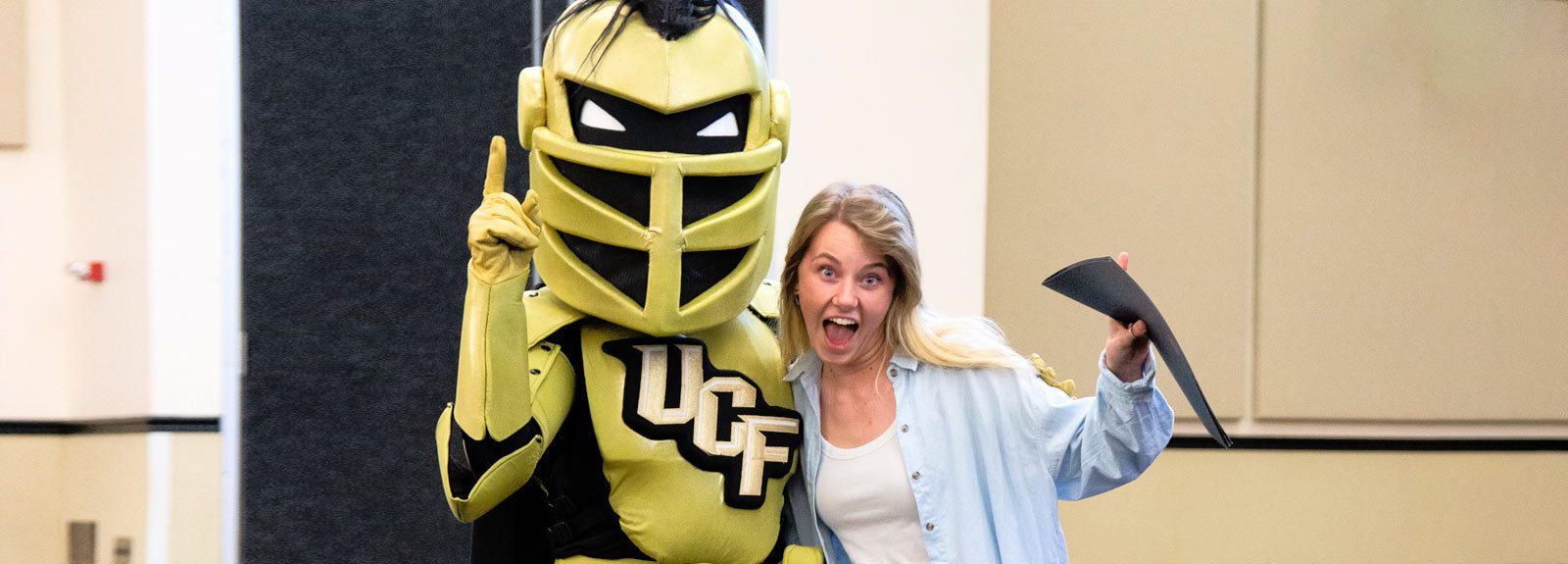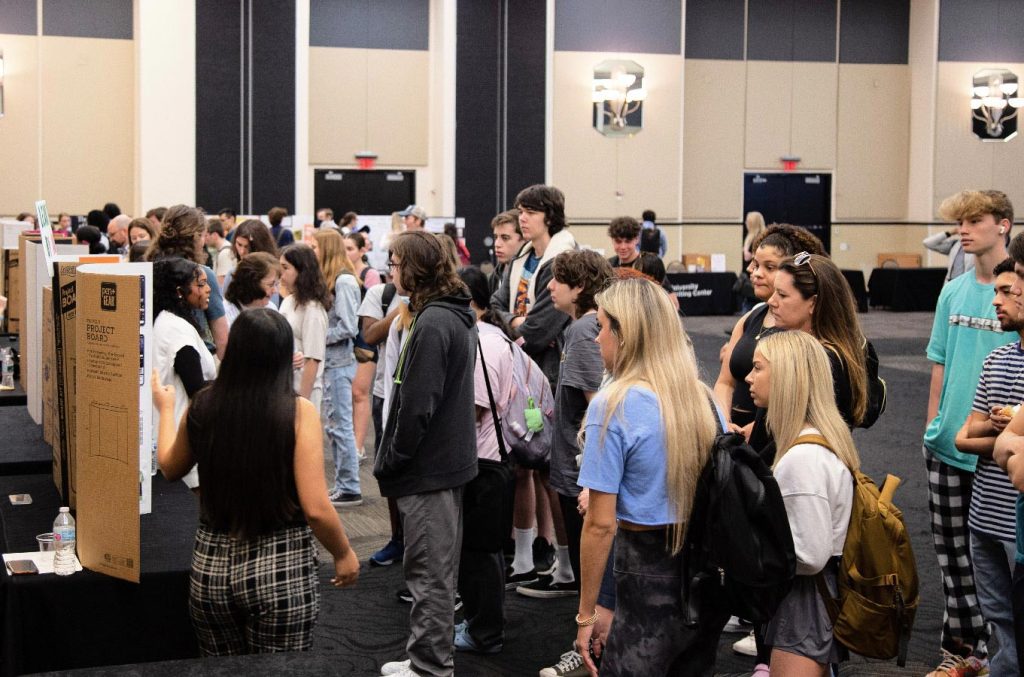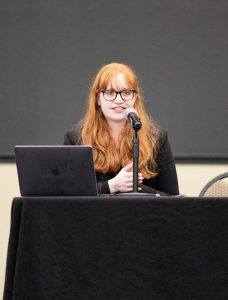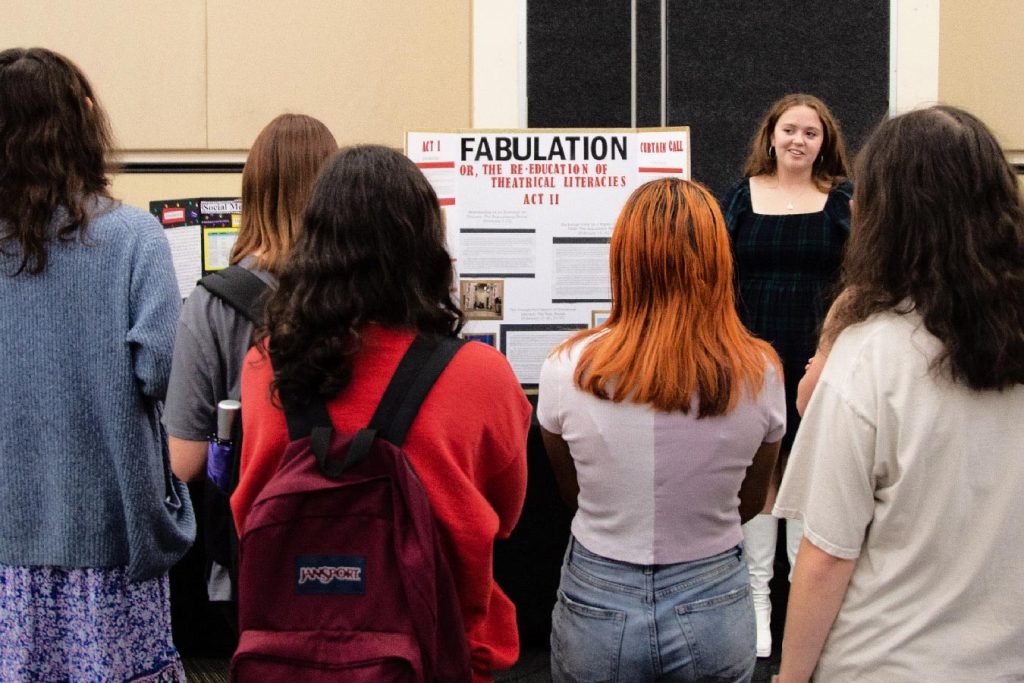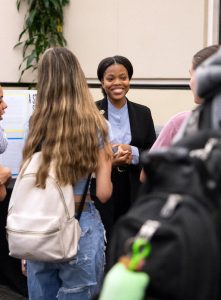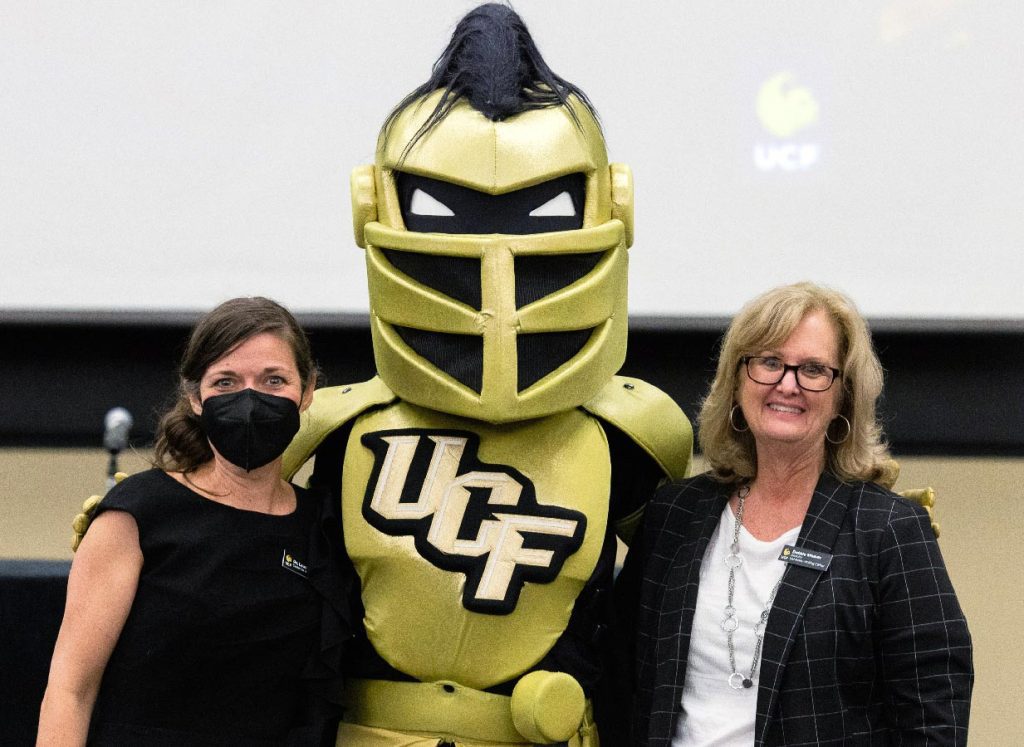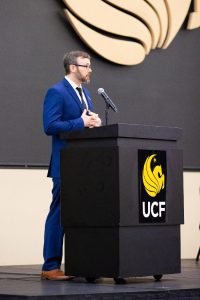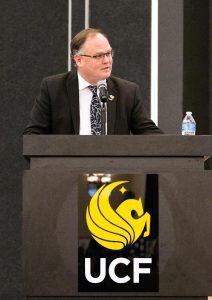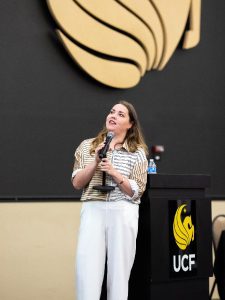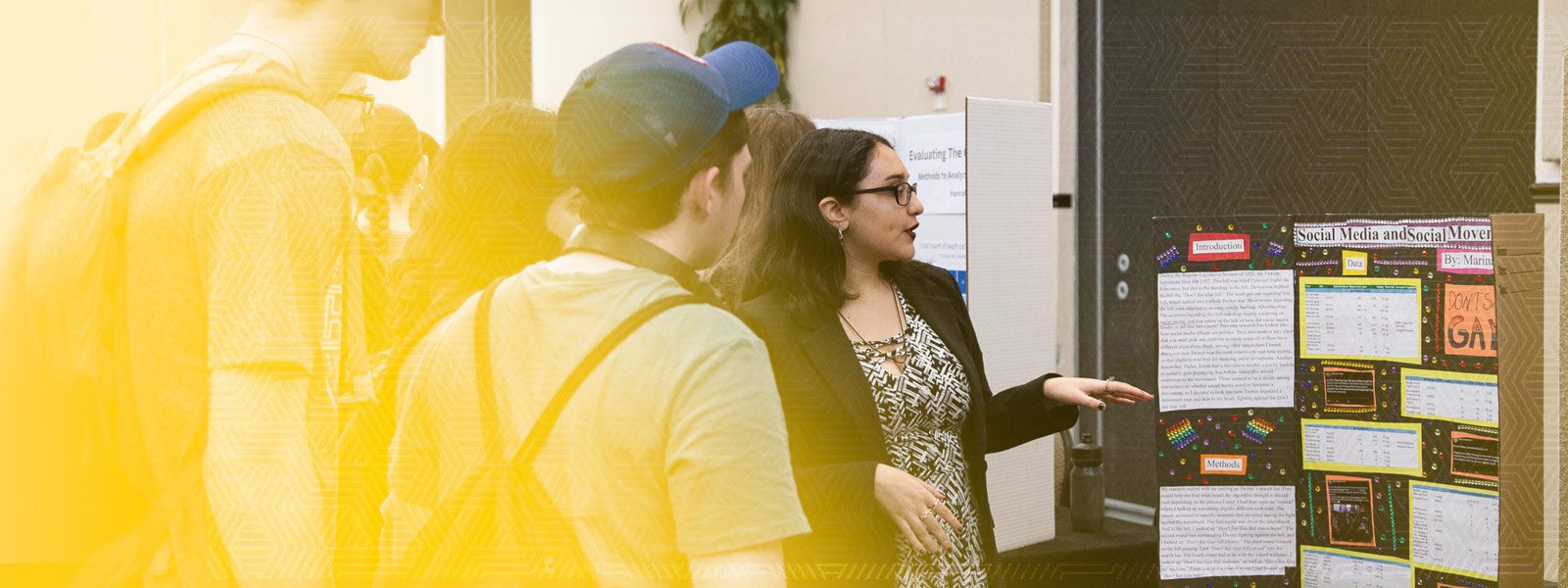
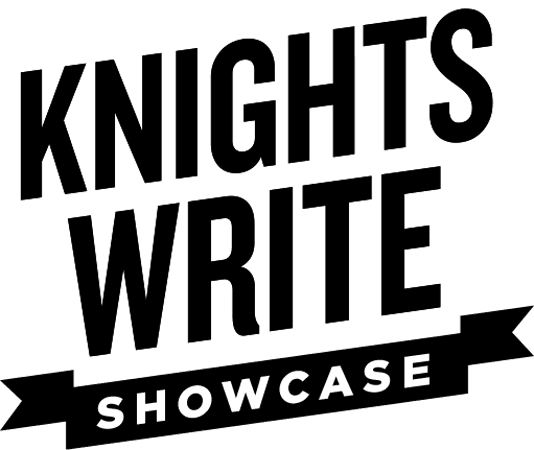
Thursday, February 13, 2025
Join us for Knights Write! This event celebrates excellence in writing at UCF.
Attendees will have the opportunity to view poster presentations displaying writing research projects, attend various panel presentations that discuss writing-related issues and ideas, and celebrate award-winning student work.
This event is hosted by the Department of Writing and Rhetoric, which contributes a vertical writing curriculum and experience for all UCF students, from first year to graduate students, and supports a vibrant writing culture by supporting faculty across UCF in the teaching of writing.
In-Person Events
February 13 • Student Union, Pegasus Ballroom
Opening remarks and welcome message.
Students from the First-Year Composition program and undergraduate students in Writing and Rhetoric courses present (multimodal) posters representing their thoughtful research on a range of topics related to writing and rhetoric.
This panel presentation will explore how four students from ENC 3375: Rhetoric and Pop Culture approached the study of rhetoric through the lens of Taylor Swift’s music and public persona. Each student will highlight a unique project from the course, demonstrating how integrating personal interests—such as pop culture figures—into academic analysis can deepen understanding and engagement with rhetorical concepts. By analyzing Swift's lyrics, media presence, and cultural impact, students will discuss how they applied theories of rhetoric to dissect real-world examples often seen as "non-academic." This approach, they argue, emphasizes the relevance and accessibility of rhetorical analysis, encouraging students to connect theoretical knowledge with contemporary cultural phenomena.
Featuring a conversation among undergraduate tutors and majors about two community partnerships, this panel will explore ways our upper-division students learn and enact valuable skills for fostering civil discourse within and beyond the university. The first part of the panel will discuss what tutors learned through engaging in community outreach efforts, including the LIFE program at UCF, which engaged in the stories of the senior community, and what they gained in hosting a workshop for students across disciplines to better understand political rhetoric. The second part of the panel will feature student testimonials about their involvement in the “One Small Step” initiative sponsored by StoryCorps and Central Florida Public Media, including about how their training as tutors prepared them to listen with curiosity, ask probing questions, and facilitate dialogue. Both initiatives show the value of cross-generational conversations among students and seniors for avoiding “us/them” assumptions and polarization, identifying shared values and unexpected connections, and learning across differences (political and otherwise) through rhetorical listening.
Students will briefly share some of their best work from either Composition I or Composition II and participate in a roundtable discussion about their learning about writing and research. They’ll share how their work came into being, including what went well and what didn’t, and they’ll describe how their products were repurposed in their ePortfolios. This session will be especially useful for those wanting to learn about different writing and research processes that helped these students learn to write in different ways. Some of the projects include analyzing the rhetoric of TikTok beauty communities, how Dungeons and Dragons literacies transfer to college academics, and considering language and identity.
"ChatGPT is ‘Mid:’ A Workshop for Students and Faculty Learning and Teaching in the AI Era"
Whether or not we use it, students and teachers are both working in the context of AI. How do large language models (LLMs) such as ChatGPT work, and how are undergraduates and instructors using them now? How might we use AI ethically--and collaboratively? This workshop will provide a brief introduction to LLMs and show how faculty and students have been using them in undergraduate courses. With examples and hands-on activities, we'll explore a few ways that AI can enhance courses as well as support critical AI literacy among students and teachers.
Whether or not we use it, students and teachers are both working in the context of AI. How do large language models (LLMs) such as ChatGPT work, and how are undergraduates and instructors using them now? How might we use AI ethically--and collaboratively? This workshop will provide a brief introduction to LLMs and show how faculty and students have been using them in undergraduate courses. With examples and hands-on activities, we'll explore a few ways that AI can enhance courses as well as support critical AI literacy among students and teachers.
Join Dean Jeffrey Moore in a celebration of award-winning student writers and scholars.
Virtual Showcase
February 13 • Via Zoom
Link: https://ucf.zoom.us/j/6505025683
This virtual roundtable session will feature several students from the Fall 2024 MA Colloquium Course presenting the “network sense” visualizations they created of the field of Rhetoric and Composition (including frequency tables/graphs, word clouds and streams, radial models, heat maps, and more). As described by Derek Mueller, network sense is a means of understanding disciplinarity through the tracking and visualization of large-scale patterns of scholarly activity, in our case primarily through conferences and journals. Whether you’re a seasoned rhetorician or someone unfamiliar with the field, we hope you’ll join us to learn from these graduate students’ perspectives about ongoing and emerging trends in the field. This session will be ideal for undergraduate majors in Writing & Rhetoric and others interested in the Rhetoric & Composition MA.
This virtual roundtable session will feature several students from the Fall 2024 MA Colloquium Course presenting the “network sense” visualizations they created of the field of Rhetoric and Composition (including frequency tables/graphs, word clouds and streams, radial models, heat maps, and more). As described by Derek Mueller, network sense is a means of understanding disciplinarity through the tracking and visualization of large-scale patterns of scholarly activity, in our case primarily through conferences and journals. Whether you’re a seasoned rhetorician or someone unfamiliar with the field, we hope you’ll join us to learn from these graduate students’ perspectives about ongoing and emerging trends in the field. This session will be ideal for undergraduate majors in Writing & Rhetoric and others interested in the Rhetoric & Composition MA.
Link: https://ucf.zoom.us/j/96299996858
This virtual session will include presentations by five students from the Fall 2024 Capstone in Rhetoric and Composition course. The presenters will be recent or upcoming graduates of the MA program in Rhetoric and Composition and will share highlights of and reflections on their final ePortfolios, which serve as their culminating projects for the degree. Speakers will discuss their future roles as educators, editors, and professional and technical writers and reflect on the ways in which their work in the program helped them to crystalize and move toward their goals.
This virtual session will include presentations by five students from the Fall 2024 Capstone in Rhetoric and Composition course. The presenters will be recent or upcoming graduates of the MA program in Rhetoric and Composition and will share highlights of and reflections on their final ePortfolios, which serve as their culminating projects for the degree. Speakers will discuss their future roles as educators, editors, and professional and technical writers and reflect on the ways in which their work in the program helped them to crystalize and move toward their goals.
